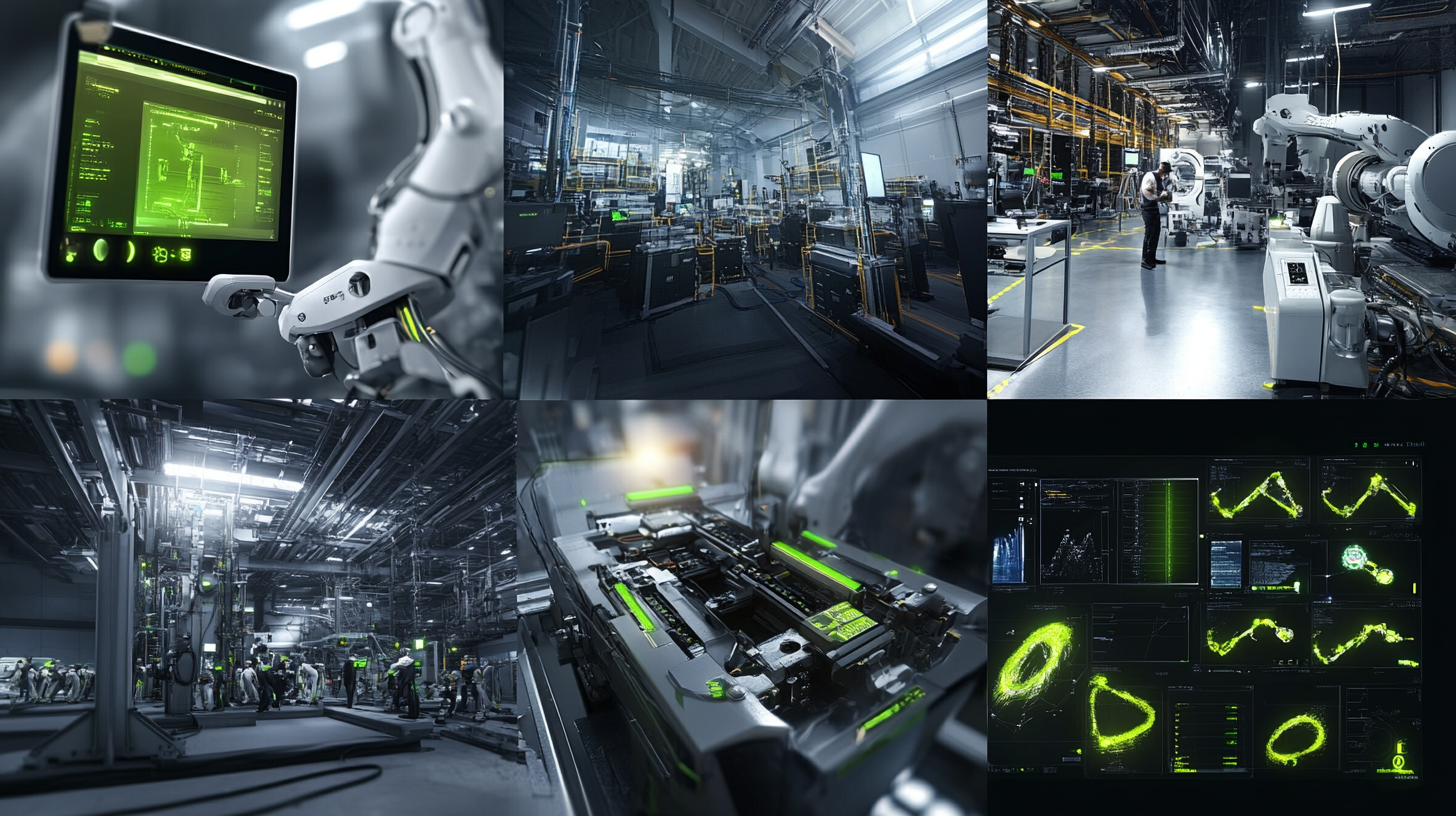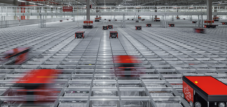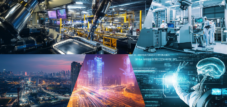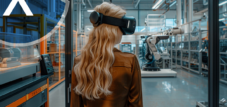Supply chain optimization and predictive maintenance in the manufacturing sector: AI is changing the industry
Xpert pre-release
Language selection 📢
Published on: December 22, 2024 / update from: December 22, 2024 - Author: Konrad Wolfenstein

Supply chain optimization and predictive maintenance in the manufacturing sector: AI is changing the industry – Image: Xpert.Digital
Opportunities for the economy: How AI will further advance the manufacturing sector in 2025
The manufacturing industry is facing an epochal change, and one of the driving forces behind it is artificial intelligence (AI). By 2025, AI will be perceived not just as a supporting tool, but as a strategic engine that drives innovation, efficiency and sustainability in the industry. This transformation will not only change work processes, but also have a profound impact on business models, sustainability strategies and the competitiveness of companies.
AI as a driving force of the manufacturing revolution
Automation in the manufacturing industry has reached a new level. While AI has so far been used primarily to automate repetitive processes, it is now capable of making complex decisions and dynamically adapting production systems. “AI is becoming a strategic partner for companies that not only optimizes processes, but also enables new business models,” emphasizes an industry expert.
With the ability to analyze massive amounts of data in real-time, AI enables manufacturing companies to achieve unprecedented agility. Machines learn to monitor and adjust their performance independently, while companies can make precise predictions about future developments. Predictive maintenance is just one example of how AI can reduce costs and minimize downtime.
Sustainability as a top priority
A key area in which AI will play a key role by 2025 is sustainability. The importance of environmental, social and governance (ESG) objectives has increased significantly in recent years, and many manufacturing companies have set ambitious climate targets. Yet there is often a gap between the investments companies make and the areas that have the greatest environmental impact. AI helps close this investment gap.
AI systems can analyze data along the entire value chain, from raw material procurement to production and logistics. This allows companies to use their resources more efficiently, reduce emissions and minimize waste. “AI gives us the opportunity to not only make sustainable decisions, but to adapt them in real time,” says an industry representative.
An example of this is the optimization of supply chains. AI can calculate CO₂ emissions along transport routes and help companies choose more environmentally friendly alternatives. At the same time, production processes are controlled in such a way that energy consumption is minimized. Intelligent algorithms ensure that machines only run when they are actually needed and suggest alternatives that use less energy.
Increased efficiency through intelligent automation
In addition to promoting sustainability, AI also drives increased efficiency in manufacturing. The use of AI-supported robots and production systems significantly increases productivity. These systems can flexibly adapt to changing production requirements, which is a major advantage, especially in times of global uncertainty.
AI-based solutions make it possible to bring products to market faster while ensuring quality. Errors in production are identified and corrected at an early stage, minimizing waste. “AI is pushing the boundaries of what is possible in manufacturing. We see a completely new dimension of flexibility and precision,” said an industry expert.
New business models and opportunities through AI
AI also opens up new business models for manufacturing companies. Analyzing large amounts of data makes it possible to identify trends and customer needs at an early stage. This allows companies to offer personalized products and services tailored to specific customer needs. Servitization, i.e. the addition of services to products, will be easier to implement with AI.
Another example is the so-called “lights-out manufacturing”, in which fully automated production facilities are operated without human presence. This vision is becoming a reality through AI technologies such as machine learning, image recognition and autonomous robotics.
Challenges and opportunities in dealing with AI
Despite all the advantages, the use of AI also comes with challenges. One of the biggest hurdles is integrating the technology into existing systems. Many manufacturing companies are faced with the question of how to successfully implement AI without disrupting their existing processes. Strategic partnerships and collaboration with technology providers play a crucial role here.
Another aspect is the handling of data. “Data is the new oil of the manufacturing industry, but it must be processed and used correctly,” explains an expert. Companies must ensure that their data quality is high and data protection guidelines are adhered to.
The impact on the world of work should not be underestimated either. While AI is creating new jobs, some traditional jobs are becoming obsolete. Companies must therefore invest in the further training of their employees at an early stage in order to make the transition easier. The role of people will change: Instead of manual work, the focus will be more on monitoring and controlling intelligent systems.
Looking into the future: The manufacturing industry in 2025
By 2025, AI will lead the manufacturing industry into a new era. Companies that use the technology strategically will increase their competitiveness and at the same time operate more sustainably. By integrating AI, they can not only reduce costs, but also make a positive contribution to society.
In summary, AI in the manufacturing industry will drive the following developments:
- Sustainable production: Less resource consumption, fewer emissions, more efficiency.
- Flexibility and agility: Faster adaptation to market changes and individual customer requests.
- New business models: From servitization to the fully automated “lights-out factory”.
- Increased efficiency: Higher productivity at lower costs.
- Transformation of the world of work: New opportunities for highly qualified jobs.
The use of AI is no longer an optional addition, but a crucial factor for the future of the manufacturing industry. Companies that invest in this technology now are laying the foundation for sustainable success in a rapidly changing world.
🔄📈 B2B trading platforms support – strategic planning and support for exports and the global economy with Xpert.Digital 💡
Business-to-business (B2B) trading platforms have become a critical part of global trade dynamics and thus a driving force for exports and global economic development. These platforms offer significant benefits to companies of all sizes, particularly SMEs – small and medium-sized businesses – which are often considered the backbone of the German economy. In a world where digital technologies are becoming increasingly prominent, the ability to adapt and integrate is crucial to success in global competition.
More about it here:
Artificial intelligence in the manufacturing sector: developments until 2025
The role of AI in the manufacturing industry
Artificial intelligence (AI) is playing an increasingly important role in the manufacturing industry and is expected to bring profound changes in 2025. It is no longer just a practical tool for automating production steps, but rather an increasingly strategic enabler for the change towards greater competitiveness, efficiency and sustainability. Wherever AI-supported systems develop their capabilities, opportunities arise that go far beyond pure process optimization. But what exactly does this mean for companies, workers and the entire economic environment?
“AI not only automates processes, but can now make manufacturing companies more flexible overall and enable them to balance technological progress with ESG goals.” This statement makes it clear that AI should not only be limited to individual aspects of production. Especially at a time when companies increasingly have to be measured by environmental and social standards, artificial intelligence makes an important contribution to the orientation and control of complex value chains. The following sections provide insight into how AI could be used in manufacturing by 2025 and what changes it will bring to the economy.
1. From automation to strategic transformation
AI-based automation processes are no longer uncommon in the manufacturing industry. Many companies are already using robotic systems, machine learning algorithms and data-driven platforms to make individual production steps more efficient and cost-effective. The next evolutionary step is to turn this selective increase in efficiency into a comprehensive strategic transformation. AI systems can independently optimize processes, react to changes in demand and use predictive analyzes to point out possible risks at an early stage. In this way, not only production itself becomes more intelligent and flexible, but the entire company can adapt more quickly to dynamic market requirements.
“It is no longer just a tool, but a strategic pioneer for change.” This change is manifested primarily in the fact that more and more companies are recognizing how much AI can contribute to sustainable, resource-saving and at the same time competitive production. Even if the implementation initially requires investments in the form of time, money and training, these efforts will pay off as soon as the corresponding AI solutions are integrated into daily business efficiently and on demand.
2. Sustainability as a corporate focus and AI as the key
Interest in sustainability has increased significantly in recent years. At the same time, many companies are aware that they must be measured against clear climate goals and strict ESG (environmental, social, governance) criteria. There is a growing gap between the desire to act sustainably and the actual implementation. This is often because companies do not know exactly in which areas their investments could have the greatest impact. This is where AI comes into play: With its ability to evaluate huge amounts of data, draw conclusions and make recommendations for action in real time, it can help direct capital more specifically to areas that have a high environmental and climate relevance.
For example, AI analysis platforms make it possible to monitor the entire life cycle of a product, from the selection of raw materials to their transport and recycling. Based on this information, it can be assessed which manufacturing steps are particularly resource-intensive. It can also be seen where optimizations can be made in terms of energy and water consumption, pollutant emissions or waste. AI-based forecasts also show where comparatively small changes can have a large impact on the environment. In this way, the investment gap in sustainability is gradually closed.
3. Optimization of production processes through predictive analysis
A key use case for AI in manufacturing is predictive maintenance. This involves monitoring machines and systems in order to predict and avoid errors and failures at an early stage. Data science models continuously examine measured values such as vibrations, temperature or product quality parameters and compare them with historical data patterns. As soon as there are signs of an impending defect, the system can sound the alarm. This enables companies to prevent expensive production downtimes and extend the service life of their systems. The result is less material wear, lower energy requirements due to optimally running machines and increased operating time. This means that not only cost savings are the direct consequences of such AI applications, but also important steps towards the careful use of resources.
Production planning can also be made increasingly efficient with the help of AI. With fully integrated systems, the entire production process can be networked: from receipt of orders through warehouse management to delivery logistics. The AI identifies bottlenecks and unused capacities, optimizes production plans and thereby increases the utilization of machines and workers. At the same time, the risk of overproduction is reduced, which in turn reduces the need for storage space and reduces raw material consumption. If intelligent algorithms are used that predict sales and material requirements based on customer behavior or seasonal conditions, the entire supply chain can be maintained much more flexibly and responsibly.
4. Adaptable value networks
Today's manufacturing companies are increasingly operating in globally networked supply chains. This not only requires smooth coordination of suppliers, producers and sales partners, but also the ability to react flexibly to short-term external influences. Events such as natural disasters, economic crises or political conflicts can lead to disruptions in supply chains. “AI is able to monitor the sustainability of the entire value chain and can help companies become more environmentally friendly.” This is precisely one of the biggest advantages of AI-supported systems: They can use data analysis and simulations to identify possible bottlenecks in advance and action scenarios suggest to minimize the risk of delivery problems.
In addition, AI will play a more important role in the global coordination of transport routes. Intelligent route suggestions and real-time data can be used to achieve mileage, time and fuel savings by, for example, avoiding traffic congestion and collecting or combining deliveries. This not only means lower costs, but also makes a valuable contribution to climate protection. For many companies, such optimizations are at the forefront of their ESG goals. AI can start directly here and enable fact-based decisions in favor of resource-saving logistics.
5. New business models and more added value
Beyond improving efficiency, AI opens up new perspectives for innovative business models in the manufacturing industry. One example is service models similar to the “Equipment as a Service” concept. The machine or system remains the property of the manufacturer while the customer pays for its use. With the help of AI systems, maintenance intervals and performance are monitored in real time, so that optimal availability of the system can be guaranteed. Both sides benefit: the customer receives reliable production conditions and the manufacturer has a continuous stream of income. This approach also has lasting advantages, as manufacturers have a direct interest in keeping the systems in a technically perfect condition for as long as possible and thus minimizing the waste of resources.
In addition, AI also enables data-based services, for example in the form of digital twins. A virtual image of the real production environment is created in order to carry out simulations and test possible optimizations before they are implemented in practice. On this basis, targeted measures can be developed that accelerate production processes and reduce costs without incurring unforeseen risks. Such digital twins have already established themselves in pioneering industries and will be part of the standard repertoire in more and more areas by 2025.
6. Skills requirements and employee training
As AI becomes more widespread in the manufacturing sector, workforce requirements are also changing. As certain routine tasks become increasingly automated, the demand for personnel with skills in data analysis, machine learning and process control is growing. Employees must learn to understand, monitor and optimize the AI systems. It is important that companies invest in further training opportunities in a timely manner in order to make their employees fit in these future fields. This not only benefits the employees themselves, but also ensures the long-term competitiveness of the company.
At the same time, there is a chance that new job profiles will emerge in the manufacturing sector. AI specialists and data analysts often work closely with production experts to develop digital solutions and connect existing systems. If implemented successfully, the attractiveness of the entire sector increases, as the boundaries between classic production and modern IT become increasingly blurred. The challenge is to make this transformation socially acceptable by involving employees in the process, showing them perspectives and seeing further training as part of a future-oriented corporate strategy.
7. Transparency and acceptance
As promising as the opportunities presented by AI are, it is important that this technology is used responsibly. Particularly in areas where human errors or incomplete data can have fatal consequences, it must be ensured that the AI systems are reliable and robust. To achieve this, companies need transparent processes and clear guidelines on how AI solutions are developed, trained and maintained. Trustworthy AI not only means that the results are correct and understandable, but also that data protection and ethical guidelines are adhered to.
Experience has shown that employee acceptance increases when the benefits are disclosed and there is no need to fear unexpected or “secret” decisions made by the AI. Therefore, open communication about the potential and limitations of AI is essential. Training and information offerings help to reduce fears and create a common understanding of the new technologies. Ultimately, AI will work most efficiently where it is perceived as a trustworthy support in everyday work.
8. Future outlook: realignment of business strategies
The changes AI will drive in manufacturing by 2025 cannot be limited to individual, isolated projects. Rather, it is to be expected that companies will have to adapt their entire business strategy in order to benefit sustainably from AI technologies. The areas of production, logistics, research, development and management are increasingly merging with one another, as AI enables an integrated perspective on all business processes. Decision-makers and managers are tasked with taking up these impulses and designing company structures so that AI innovations can be tested and established quickly.
At the same time, long-term orientation is becoming more important. “For many manufacturing companies, sustainability is a top priority.” Uniform AI platforms enable all departments to be connected so that information can be shared and evaluated in real time. Whether energy consumption, material procurement or personnel planning – AI everywhere provides information on how processes can be refined or restructured in order to become more economically efficient and sustainable. This continuous improvement process can become a significant competitive factor and have a positive impact on the image. Companies that get involved here at an early stage are well positioned to expand market shares and position themselves as pioneers for green and innovative production.
9. Economic and social implications
The economic opportunities resulting from the use of AI are enormous. At the same time, there are also social impacts that cannot be neglected. Increasing productivity and falling costs can lead to certain services becoming cheaper and therefore accessible to a wider population. Examples of this include longer-lasting products that need to be repaired or replaced less often, or innovative manufacturing processes that strengthen regional locations and reduce long transport routes.
At the same time, heavily AI-driven manufacturing could create new technology conflicts if, for example, individual regions or countries have less access to relevant data or technical resources. International cooperation and responsible regulation can help avoid such imbalances. Since many companies use global supply chains, collaboration with suppliers also plays a major role in ensuring that AI applications are actually used consistently and responsibly.
10. AI as a driver for sustainable progress
By 2025, AI will undoubtedly transform the manufacturing industry – both at a process and strategic level. “The investment gap in sustainability will be closed.” This forecast underpins the trend of using AI not only to reduce costs, but also to specifically achieve ecological and social goals. The advantages are obvious: automated processes run more efficiently, reduce waste and increase product quality. At the same time, AI systems make it possible to make informed decisions, build sustainable supply chains and develop new business models that fit perfectly into companies' ESG strategies.
A clear vision, transparent structures and the consistent qualification of employees are crucial factors. Only then can the full potential of AI be exploited without endangering social acceptance or violating data protection aspects. Ultimately, it's about looking at classic production systems in a new light: AI offers a great opportunity to combine economic success and ecological responsibility. If companies seize this opportunity, manufacturing can truly become a leader in 2025 – demonstrating how technology, sustainability and societal progress go hand in hand and set new standards for the industrial sector.
We are there for you - advice - planning - implementation - project management
☑️ SME support in strategy, consulting, planning and implementation
☑️ Creation or realignment of the digital strategy and digitalization
☑️ Expansion and optimization of international sales processes
☑️ Global & Digital B2B trading platforms
☑️ Pioneer Business Development
I would be happy to serve as your personal advisor.
You can contact me by filling out the contact form below or simply call me on +49 89 89 674 804 (Munich) .
I'm looking forward to our joint project.
Xpert.Digital - Konrad Wolfenstein
Xpert.Digital is a hub for industry with a focus on digitalization, mechanical engineering, logistics/intralogistics and photovoltaics.
With our 360° business development solution, we support well-known companies from new business to after sales.
Market intelligence, smarketing, marketing automation, content development, PR, mail campaigns, personalized social media and lead nurturing are part of our digital tools.
You can find out more at: www.xpert.digital - www.xpert.solar - www.xpert.plus


























